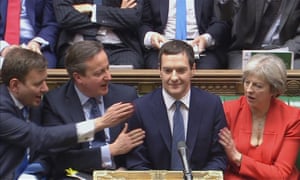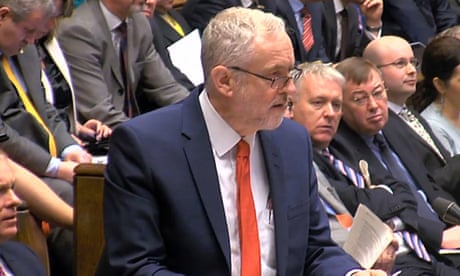Chancellor announces range of eye-catching measures including levy on sugary drinks, but Office for Budget Responsibility warns of looming fiscal hole
 George Osborne has been accused of using a range of accounting devices to disguise a looming ‘black hole’ in the government’s finances. Photograph: Reuters Tv/Reuters
George Osborne has been accused of using a range of accounting devices to disguise a looming ‘black hole’ in the government’s finances. Photograph: Reuters Tv/Reuters
George Osborne’s attempt to woo voters ahead of Britain’s EU referendum has come under immediate and intense scrutiny after he used a range of accounting devices to disguise a looming £56bn “black hole” in the government’s finances and deliver a promised surplus by the end of the decade.
Despite being faced with a markedly weaker outlook for the economy, the chancellor announced a range of eye-catching measures on Wednesday including a levy on sugary drinks, lower income tax bills, a cut in corporation tax and help for small businesses, in a budget he said would “put the next generation first”.
But Osborne’s plans were greeted with a degree of scepticism by the Office for Budget Responsibility (OBR) – the body he created in 2010 to provide independent forecasts for the economy and the public finances.
Wednesday’s statement was Osborne’s last before voters go to the polls to decide whether Britain will remain in the EU. A vote to leave would be widely expected to trigger a Conservative leadership contest, in which the chancellor would square up against Boris Johnson, the outgoing mayor of London and darling of grassroots Tory party members.
The chancellor sought to show his backbenchers – and the public – that his stewardship of the economy will allow him to hit his target of delivering a surplus on the public finances by 2020, while still tempting voters with tax cuts.
But the OBR slashed its growth forecasts for each of the next four years and said the chancellor would only be able to avoid breaking the third of his three fiscal promises by “shuffling” spending and tax receipts to engineer a £10bn surplus in 2019-20.

What the 2016 budget means for you
Robert Chote, the OBR’s director, said pointedly that Osborne was meeting “the letter” of his self-imposed rule to run a budget surplus by the end of the current parliament, noting that “giveaways” averaging £6bn in 2017-18 and 2018-19 would be followed by “takeaways” averaging £13bn in the following two years.
In total, Chote said the weaker than expected outlook had blown a £56bn hole in the public finances over the next five years – more than twice the £27bn improvement Osborne was handed in the autumn statement, which helped pay for his costly U-turn on tax credits. “The sofa has swallowed roughly two pounds this time for every one that it yielded last time,” Chote said.
The chancellor has already missed his targets for capping welfare spending and debt reduction, and the OBR said he would have broken his deficit reduction rule had he not deferred tax increases for companies, increased pension contributions for Whitehall departments, brought forward infrastructure spending and intensified the squeeze on disability benefit payments.
Higher rate taxpayers were the main beneficiaries of Osborne’s income tax cuts. A distributional analysis by Liverpool Economics for the Guardian showed that the changes to income tax thresholds would benefit better-off families far more than those on low and middle-incomes. On average the top 10% of families would gain by more than £400 a year – more than five times as much as families in the middle of the income distribution.
David Finch, senior economic analyst at the Resolution Foundation, said: “Everyone likes to pay lower taxes, but these income tax cuts will largely benefit higher income households. That is hard to justify at a time of major fiscal pressure.”
The chancellor said tax cuts would be paid for by a fresh attack on tax avoidance and by unspecified government efficiency savings.
“This is a budget that gets investors investing, savers saving, businesses doing business; so that we build for working people a low tax, enterprise Britain. Secure at home, strong in the world.”
The big surprise was Osborne’s announcement of a tax on sugary drinks, designed to combat childhood obesity. When introduced in 2018, the tax will raise £500m by levying a charge of up to 8p on a standard 330ml can.
But the chancellor could face a backbench rebellion over controversial cuts to disability payments. The budget revealed that a cumulative £4bn will be cut from the budget for disabled people over the course of the parliament, in a move Labour described as “morally reprehensible”.
Jeremy Corbyn, the Labour leader, accused Osborne of delivering a budget with“unfairness at its very core”.

We won't cut spending, McDonnell promises as Labour derides budget
Read more
The leader of the opposition added: “The budget the chancellor has just delivered is actually the culmination of six years of his failures. He’s failed on the budget deficit, failed on debt, failed on investment, failed on productivity, failed on trade deficit, failed on the welfare cap, failed to tackle inequality in this country.”
Osborne was forced to admit that the OBR had not only cut its GDP forecasts, by an average of 0.3 percentage points in each of the next five years, but had also cut its estimates of the economy’s long-term growth potential, with consequences for living standards and the public finances.
He blamed turbulence in the global economy for the weakness but insisted the UK was in a better state to cope with problems than it had been before the so-called Great Recession of 2008-09. “The British economy is resilient because whatever the challenge, however strong the headwinds, we have held to the course we set out.”
Advertisement
However, Chote said: “In the short time since our November forecast, economic developments have disappointed relative to expectations and the outlook for the economy and the public finances looks materially weaker.”
The OBR downgraded its forecast for growth in 2016 to 2%, from 2.4% in its last outlook in November. Even by 2020, it is expected to be growing at a pace of just 2.1%, well below the rate previously regarded as the economy’s long-term trend.
“Weaker potential output growth in turn means weaker growth in spending and incomes and a significant loss of tax revenue,” Chote said.
While the budget has pencilled in tax increases and spending cuts for the final year before the election, in the short term it was packed with giveaways. Under-40s will be able to save up to £4,000 a year tax-free in a new lifetime Isa and receive a top-up of £1,000 a year from the Treasury. They will be able to continue saving until they are 50 and then choose whether to withdraw the cash to fund the deposit for a house or keep it for retirement.
A radical shakeup of the tax system for companies will result in larger firms paying up to £9bn more each year, while small firms receive a £7bn cut as part of what the chancellor called a road map towards a fairer system. Capital gains tax will be also be cut, from 28% to 20%, to “put rocket boosters on the backs of enterprise and productive investment”.
Budget 2016: magical thinking from charmed world of the chancellor
Jonathan Freedland

Read more
Osborne describe the new approach, which includes increasing the threshold for business rates, as “a £7bn tax cut for our nation of shopkeepers. A tax system that says to the world: we’re open for business. A government that’s on your side”.
A barrage of anti-tax-avoidance measures, plus levying gambling tax on the “free bets” given by bookmakers and forcing employers to pay national insurance contributions on staff redundancy payments over £30,000, are slated to bring in almost £3bn a year by 2019-10, although the OBR pointed out that the revenue from tax avoidance could be uncertain.
The chancellor said he would press ahead with fulfilling the Conservatives’ manifesto promises to move the personal tax allowance towards £12,500 by 2020 and to increase the threshold at which employees pay the higher rate of income tax, towards £50,000.
The TUC general secretary, Frances O’Grady, said the chancellor’s plan was failing on productivity and pay. “A fair budget for the next generation would have delivered far more investment in infrastructure, jobs and homes and fewer eye-catching gimmicks.”
Simon Ward, chief economist at Henderson Global Investors, said: “Osborne presented another hyperactive budget containing apparent fiscal rectitude with a range of popular measures. The reality is that his forecast numbers rely on accounting tricks, unspecified future spending reductions and more stealth taxes, and would be blown out of the water by another recession or a rebound in borrowing costs.”




No comments:
Post a Comment